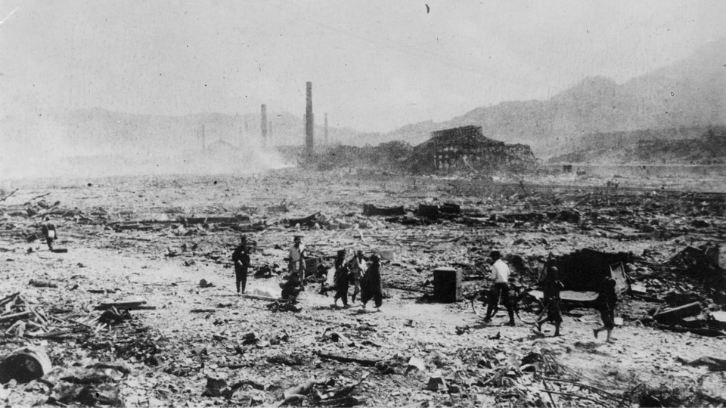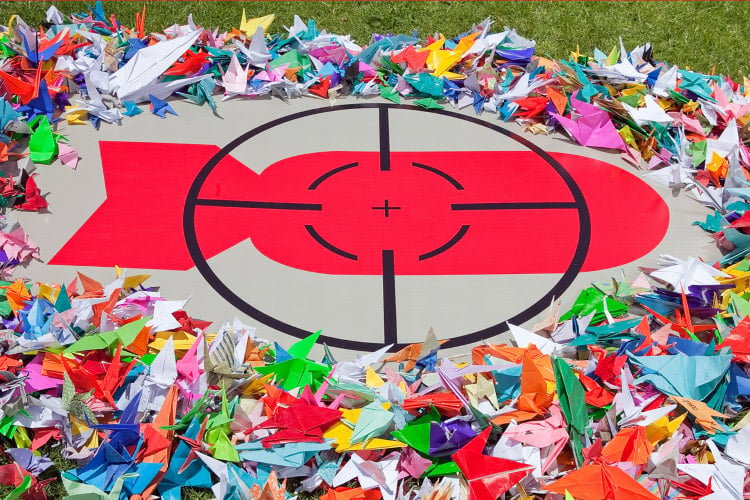

On 22 January the United Nations Treaty on the Prohibition of Nuclear Weapons became law. With that, the 51 countries that have so far joined the treaty committed to an absolute and permanent ban on the bomb.
Although we live in challenging times, we have been given a glimpse of a brighter future.
“It is the first global agreement to comprehensively prohibit these weapons and it brings us a closer to a safer, nuclear-weapons-free world,” says Tara Gutman, a legal advisor with our International Humanitarian Law team. “It signals the beginning of the end of nuclear weapons.”
In all the countries that have joined it is now illegal to use, develop, test or stockpile nuclear weapons, and to threaten to use nuclear weapons or allow them to be installed or deployed on their territory. As well, the treaty commits countries to clearing contaminated areas and helping victims.
For 75 years, the International Red Cross Red Crescent Movement has called for the prohibition and elimination of nuclear weapons. This call has been heard.
Join us as we celebrate the dawn of a new era and let your family and friends know you support a world without nukes.
The Japanese cities of Hiroshima and Nagasaki were wiped out when nuclear bombs were dropped on them in 1945. Tens of thousands of people were killed instantly, medical facilities were obliterated and survivors faced appalling conditions.
Tens of thousands more people died in the following years due to radiation poisoning, with an estimated 340,000 deaths across both cities over the next five years.
Japanese Red Cross hospitals have been caring for survivors of radiation exposure and their descendants for the last seven decades.

Australia’s First Nations People still suffer today from the effects of nuclear weapons testing in their homelands. Twelve major nuclear weapons tests and hundreds of small-scale tests were conducted in Australia by the United Kingdom between 1952 and 1963.
The risk of nuclear conflict or accident is higher now than it has been for decades. There are 15,000 nuclear bombs in the world today, of which 1,800 are ready to be launched in an instant. One lesson we have all learnt from the current global pandemic is that low-probability events can and do occur, with devastating effects.
These weapons would cause catastrophic destruction and as long as they exist there is the risk they could be detonated – intentionally, by accident or by miscalculation. This is why we believe the elimination of nuclear weapons is an existential imperative.
The only way to remove the threat nuclear weapons pose is to eliminate them.
Humanitarian relief is core business of the International Red Cross Red Crescent Movement. But, even as the world’s largest humanitarian network, we would be unable to adequately respond to any use of a nuclear weapon.
Most nuclear weapons in arsenals today are many times bigger than those dropped on Hiroshima and Nagasaki. Their use, even on a limited scale, would cause incalculable human suffering. Radiation would make the blast site and surrounding areas inaccessible and lead to horrific long-term health problems. Hospitals would be destroyed and no usable infrastructure would remain.
What we cannot prepare for, we must prevent.
Since 1948, the Movement has advocated for the prohibition of weapons of mass destruction, and nuclear weapons in particular. Australian Red Cross has been one of the Movement's most active advocates, working with civil society to make the elimination of nuclear weapons a reality
Use these cards with your family and friends to start a conversation around the importance of eliminating nuclear weapons.
Hold a No Nukes Trivia Night for your friends and family. We have 10 questions to get you started and our IHL team can help you with more (email us at ihlupdate@redcross.org.au).
This toolkit is for anyone wanting to get involved in the work to help end nuclear weapons. It's packed with ideas and resources to support you in making a difference.

Five years of the Treaty on the Prohibition of Nuclear Weapons.
Red Cross pays our respects to the Aboriginal and Torres Strait Islander custodians of the country where we work, and to Elders, past, present and emerging.
Learn about our Reconciliation Action Plan and how we can all make reconciliation real.
This website may contain the images, voices or names of people who have passed away.


© Australian Red Cross 2026. ABN 50 169 561 394
